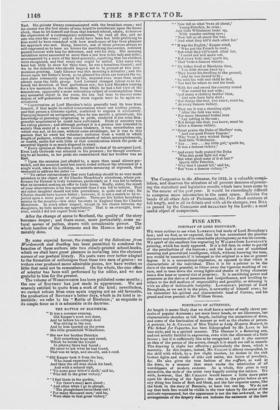By some especial favour, the compiler of the Selections from
Wordsworth and Southey has been permitted to condense the beauties of these authors into two closely-printed school-books, which we shall have great pleasure in installing into the choicest corner of our poetical library. No poets were ever better adapted to the formation of anthologies than these two men of genius no writers ever produced more admirable pieces, few have written so little that need not be remembered. On the whole, the nice office of selector has been well performed by the editor, and we are grateful to him for the present. The volume of WORDSWORTH has been published some months ; the one of SOUTHEY has just made its appearance. We are scarcely entitled to quote from a work of the kind; nevertheless, we cannot refrain from once again copying out an old favourite, the production of SOUTHEY'S better days, which in its kind is in- imitable: we refer to his " Battle of Blenheim ;" as exquisite in its simple force as it is admirable in its doctrine.
THE BATTLE OF BLENHEIM.
" It was a summer evening,
Old Kaspar's work was done, And he before his cottage door Was sitting in the sun, And by him sported on the green His little grandchild Wilhelmine.
" She saw her brother Peterkin Roll something large and round, Which he beside the rivulet In playing there had found ; He came to ask what he had found, That was so large, and smooth, and round.
" Old Kasper took it from the boy, Who stood expectant by ; And then the old man shook his bead, And with a natural sigh, 'Tis some poor fellow's skull,' said he, ` Who fell in the great victory.'
I find them in the garden, For there's many here about ; And often when I go to plough, The ploughshare turns them out ' For many thousand men,' said he Were slain in that great victory,
'I
" Now tell us what 'twas all about,' Young Peterkin, he cries ; And little Wilhelmine looks up, With wonder-waiting eyes ; Now tell us all about the war, And what they kill'd each other for.'
'" It was the English,' Kasper cried, Who put the French to rout; But what they kill'd each other for, I could not well make out. But every body said,' quoth he, That 'twas a famous victory.
" My father lived at Blenheim then, ' Yon little stream hard by ; They burnt his dwelling to the ground, And he was forced to fly ; So with his wife and child he fled, Nor had he where to rest his head.
" ' With tire and sword the country round Was wasted far and wide ; ` `And many a chaffing mother then, And new-born baby died ; But things like that, you know, must be, At every famous victory.
" They say it was a shocking sight After the field was won ; For many thousand bodies here Lay rotting in the sun ; But things like that, you know, must be After a famous victory.
" ' Great praise the Duke of Marlbro' won, And our good Prince Eugene.' Why 'twas a very wicked thing !' Said little Wilhelmine.
Nay ... nay ... my little girl,' quoth he, It was a famous victory.'
" And every body praised the Duke Who this great fight did win.' ' But what good came of it at last ?' Quoth little Peterkin.
Why that I cannot tell,' said he, But 'twas a famous victory.' "


























 Previous page
Previous page